The Sum of it all: In conversation with Deryck Whibley

Friday morning, in the shadow of Times Square’s looming billboards, Deryck Whibley disclosed to me the whirlwind life he’s lived. And though the Sum 41 frontman across from me was nothing but gentle and soft-spoken, his story — not unlike his stage presence — is anything but.
Since the fateful day in 1996 when Whibley’s high school band christened themselves “Sum 41,” it seems he hasn’t had a moment to catch his breath. From being restless teenagers taking on Toronto, the group were swiftly catapulted into the thick of the early aughts industry. It was an era teeming with MTV hopefuls, TRL stardom, and spawned a surge in the sonic landscape that fused hooky pop with fast-paced, snarky punk music. In the midst of it all, Sum 41 broke out fast and fiercely — with no dearth of hair gel, or nü-metal angst in tow. Fresh off their high school campus, the band checked each cultural box within a couple of years — inking a deal with Island Records in 1999, releasing a debut LP, All Killer No Filler, in 2001, and finding wild mainstream success with the latter’s first single, “Fat Lip.” In the wake of it all, they got to perform live with their heroes, Tommy Lee and Rob Halford, for MTV’s 20th anniversary show, and went platinum.
Read more: Sum 41 still remember creating the magic and mayhem behind their 2002 hit “Still Waiting”
Since those initial milestone moments, it’s been a nonstop marathon of album cycles and global tours for Sum 41 and especially Whibley, a constant member for over 25 years. Through it all, the band have seen lineup and label changes, valleys and peaks in both their professional and personal lives. Whibley himself has gone through a fairly public divorce, remarried, and has two children. He’s hit bottoms and been on the brink of death (twice), struggled with his health and with a crippling substance abuse disorder — only to rise from each experience with admirable clarity and a newfound sense of self. Just last month, he announced a decade of sobriety. You can only imagine it’s all been an exhilarating ride for the artist — albeit an exhausting one.
Kevin Wilson
In May of last year, Sum 41 announced their end. 2024 would see their last record, and their final tour. When asked why, Whibley tells me he got “burnt out.” It was time to take a break, to create and explore space for himself outside of the band he’d been in since age 16. He’s releasing a book, an autobiography. Though, drained as the artist may be, it certainly hasn’t translated in his last efforts with Sum 41, or taken him out of the zone. The band’s final project, Heaven :x: Hell, a whopping double album, spans the band’s full history, representing the full scope of sounds they’ve explored over 28 years — Heaven’s tracklist focuses on pop-punk leaning songs, while Hell is dedicated to heavier, metal-inspired pursuits. It’s an ode to their teenage selves, who were equally obsessed over Fat Records as they were with Pantera and Metallica — bands Whibley now plays for his son. “It’s the only thing that chills him out,” he says. It represents the music they made, and the growth in and around it that happened over years of dedication to Sum 41 and all they knew it could be.
The project is full of energy, evident passion, and its impact is massive — as much on audiences as the band themselves. The gusto is still there, as it was in All Killer No Filler — and it’s something they are carrying out onstage as well, during their global last hurrah, “Tour of the Setting Sum.” I know this, because I caught them on the New York stop at Brooklyn Paramount — and there was nothing eulogistic about the set. It was purely celebratory, a gut-punch of nostalgia with a lively introduction to their new songs, which the crowd embraced and shrieked along to. It brought me back to Warped Tour days — fans going full-throttle, energy and excitement high — though this time, most of the gauged ears in the room have been sewn up. But there was the same level of unbridled showmanship, engagement, and reaction when we all heard Whibley’s iconic croon, “The faster we’re falling, we’re stopping and stalling/We’re running in circles again…”
In conversation with Deryck Whibley, we spoke about the fear of change, how to say goodbye, and a life lived between Heaven and Hell.
Kevin Wilson
With everything that’s going on with you and Sum 41, I don’t know where to start — but the new album is definitely bold and impressive. It’s so interesting to have these sounds you’ve explored throughout Sum 41’s career really laid out as two different worlds. When you went into the studio to make such a massive, encapsulating album, did you know it was the band’s last?
DERYCK WHIBLEY: None of it. We didn’t know we were making a double record, or that it was going to be pop punk and heavier stuff. When the pandemic started and everyone went into lockdown, I didn’t want to think about Sum 41 at all. Because since we graduated high school, it’s just been going. We got signed about a year after we graduated, and so from that moment on, we’ve been on tour and making records. I was starting to burn out in 2019 — so a break felt really good. During that time, I started getting calls from managers and labels, saying, “Would you remotely work with some of these artists?” I thought, “I don’t mind doing that. I just don’t want to work on Sum 41.”
So I started writing all these songs, which were really leaning pop punk. I was like, “Fuck, I didn’t even know I could write a pop-punk song” — it’s been 15 years, maybe more. But as I wrote, I started liking the songs, and in the end, I decided to keep them all — but I still didn’t think those pop-punk songs were for Sum 41.
I had some other heavier songs that were unfinished from the last record, as well. As the pandemic dragged on, I just kept writing, long story long. When I had about 17 songs, I realized I should go listen to them all and see what I had. I put all the pop-punk ones on first and then all the heavy ones after so I could wrap my head around each sound. That’s when it dawned on me that this could be a Sum record. That all along I’d been making a Sum 41 record.
Kevin Wilson
The best things are made with no expectations.
WHIBLEY: The decision to make it the final record didn’t come until it was finished. Like I said, previous to 2019, I was having thoughts of, “How long am I going to do this? I know I like music, but do I really want to just do this one band? I’ve been in this band since 10th grade. Will I ever do something else?” And listening back to the record, I realized this is a great record to be our final. It sums up the whole band sonically. It felt like the work was complete.
Well, I feel like it’s very impressive to have that awareness and realize that. More often than not, it just keeps going.
WHIBLEY: Change is scary for most people. It brings on fear. A lot of people stay in whatever they’re doing, whether it’s jobs or living in a city. It’s hard to change. But I’ve always been somebody who likes that fear. I do better when there’s something I have to fight against. I don’t do as well when things are predictable and easy. Maybe it’s just how my life is — I don’t want to call it a struggle — but I’m always pushing.
You recently spoke publicly about your 10 years of sobriety. Congratulations. Lots of heaven and hell on that journey, at least from my own experience.
WHIBLEY: It’s funny because it was one of those things where I’m like, “Holy shit! 10?” These days, life is just going, and then something will come up that’ll remind me. But [drinking] is not something I think about on a daily basis anymore.
For me, and this doesn’t apply to everybody — whether it’s, again, moving or a job or quitting smoking — in order to change, I had to let go. To realize that my identity had been wrapped up in it. Drinking and partying — I was that guy — but once I accepted that I wanted to be healthy and sober, and that could be my new identity, it became easy. A shift happened, and I don’t think about it much anymore. I don’t regret any of the past, but I don’t want to be that.
Kevin Wilson
What do you think made it easy for you to reach a point where you could let go of that identity?
WHIBLEY: It was a moment, and a message, that came from Iggy Pop. When I first was in the hospital, I was in such a panic. I didn’t know what to do. I was so freaked out. First of all, I was in the hospital for a long time, and it was touch and go, and they were unsure if I was actually going to make it out of the hospital at all. I reached out to a couple of people who I knew had been through it all — Tommy Lee and Iggy Pop. They really helped me through, when I was so worried, and didn’t know what to do. When I got out of the hospital, finally, I talked to both of ’em on the phone, and that’s when the biggest shift came. Iggy said, “The first thing you need to do is forget who the fuck you thought you were, and become the person who you really are.”
That’s heavy.
WHIBLEY: It all just clicked. I was playing this part of someone I thought I was supposed to be, this role that I had been in for so long. It wasn’t me — it was just an identity I’d created. And I had to let it go.
When you were in high school, before the MTV hit and the steep and swift incline afterward, did you have any idea that that’s how it would be one day? Did you see it coming at all?
WHIBLEY: I didn’t know how it would work. Before Sum 41 started in 10th grade, I’d been in a couple of different bands. And from day one, in those early bands, I always thought that was going to be the band that was going to make it.
Kevin Wilson
What were the band names?
WHIBLEY: Eternal Death was my first one. The other one was Casper, and that turned into Sum 41. Then we just changed our name, changed the sound, and changed everything, but it was all still the same members. In those early bands, I just always thought that was going to be the band that was going to make it.
So it was never a hobby for you?
WHIBLEY: No, it was definitely a career path. Right from the beginning. When I go back as long as I can remember, probably about 6 years old I remember thinking, “I want to do this when I grow up.”
What was your exposure to music growing up?
WHIBLEY: Mostly stuff that my parents would be listening to. My mom is young. She had me when she just turned 17, so she was still listening to cool music like Stones, Aerosmith, Van Halen… And from what I can remember, I really got into the Monkees. It was a TV show that was heavily on reruns. That was actually my first concert in 1986. And that was the moment that I can remember saying, “This is what I want to do.” I was 6 years old. I saw a band I listened to and had all their cassette tapes, and then here they are playing.
Kevin Wilson
That’s so cool. When you started making the first album as Sum 41, what were you guys listening to?
WHIBLEY: The heavy rotation was a lot of Fat Records, punk bands of the early and mid-’90s, NOFX, Lagwagon, Strung Out, Good Riddance, Bad Religion, Pennywise. But we also loved Pantera, Iron Maiden, and Metallica. On the other hand, I was really heavily into Elvis Costello and Frank Sinatra, which I listened to on a daily basis.
Music is truly one of the best ways to describe yourself, especially your younger self, to others. It’s a great tie-in with the album, telling “the story of Sum 41” by retracing your high school steps. The daunting question, what’s next?
WHIBLEY: Even though it’s a final record, it’s still a long tour, and it’s a brand-new album. I’m really focusing on it. It needs all my energy and focus. So I don’t really know what I’m going to do next.
Just to be in this band and do what I do in my role is just all day every day, and there’s never a day off — which is part of the reason why I want to do something different. But for now, I am focusing on this, the way I always do, and seeing it through to the very end. Then, I’ll wake up the day after the last show and go, “Holy shit, the fuck do I do now?”
Kevin Wilson
I can only imagine, having seen you perform, that it takes being very present and engaged to the fullest. Does anything feel different about touring, knowing it’s the last tour?
WHIBLEY: Only sometimes. Only at the end of the show when I have to remind myself not to say, “We’ll see you again.” And I go, “Oh, wait, this is the last time. Holy shit.” But throughout the show, you’re just in it. Then as it gets to the end, I’m like, “Oh man, I have to say goodbye to everybody.” I tend to forget when I’m up there.
That’s a testament to your ability to really be in the room — and a gift to the audience, a celebration rather than a eulogy. Anyway, it’s not necessarily an end because things went bad. It’s a triumphant close.
WHIBLEY: I know. We’ve gone through bad periods, and I don’t think if we continued that it would get bad again. We’re much older, and we’ve dealt with all that kind of shit. Sum 41 is in a great place, every aspect of it. It does feel like when we’re up there — it’s a celebration for us.
Kevin Wilson
You also have an autobiography, Walking Disaster: My Life Through Heaven and Hell, coming out in October. How long have you been working on it?
WHIBLEY: It has been in the works for a long time, probably a couple years. The conversation has come up. I’ve been approached. I’ve had meetings and just never really felt it was the right time. Then about a year or two ago, I started taking it more seriously and started going down the process and started working with the publisher, working at a deal, all that kind of stuff. All the behind-the-scenes shit. I wasn’t writing anything yet, but just working out the whole logistics of it all. Then when I started writing, it was probably this past September. I think from page one to the last page, I counted the days. It was about exactly six weeks to write the whole book. But even this morning I was just adding another line in. It has to be done by Monday.
And you’re still adding lines? I’m floored. Have you enjoyed the process?
WHIBLEY: Yeah. It’s weird because I didn’t do this intentionally, but I think because I’ve produced myself for so long that I have to look at my own music differently. So I go into my writer brain, and I write, and then I step back, and I become the producer, and I look at it and try to be objective, as if it’s not me who wrote it and say, “Is this good? Is that weird good? Or is that vocal?” Take good and be harsh on myself or praise myself, or whatever it is I have to do to just get the best of the music. So I did the same kind of thing.










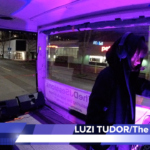
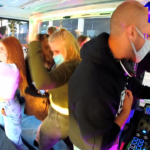
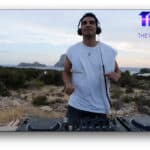

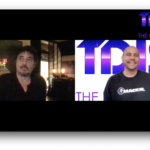


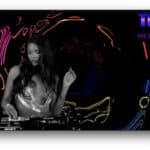
Comments
This post currently has no comments.